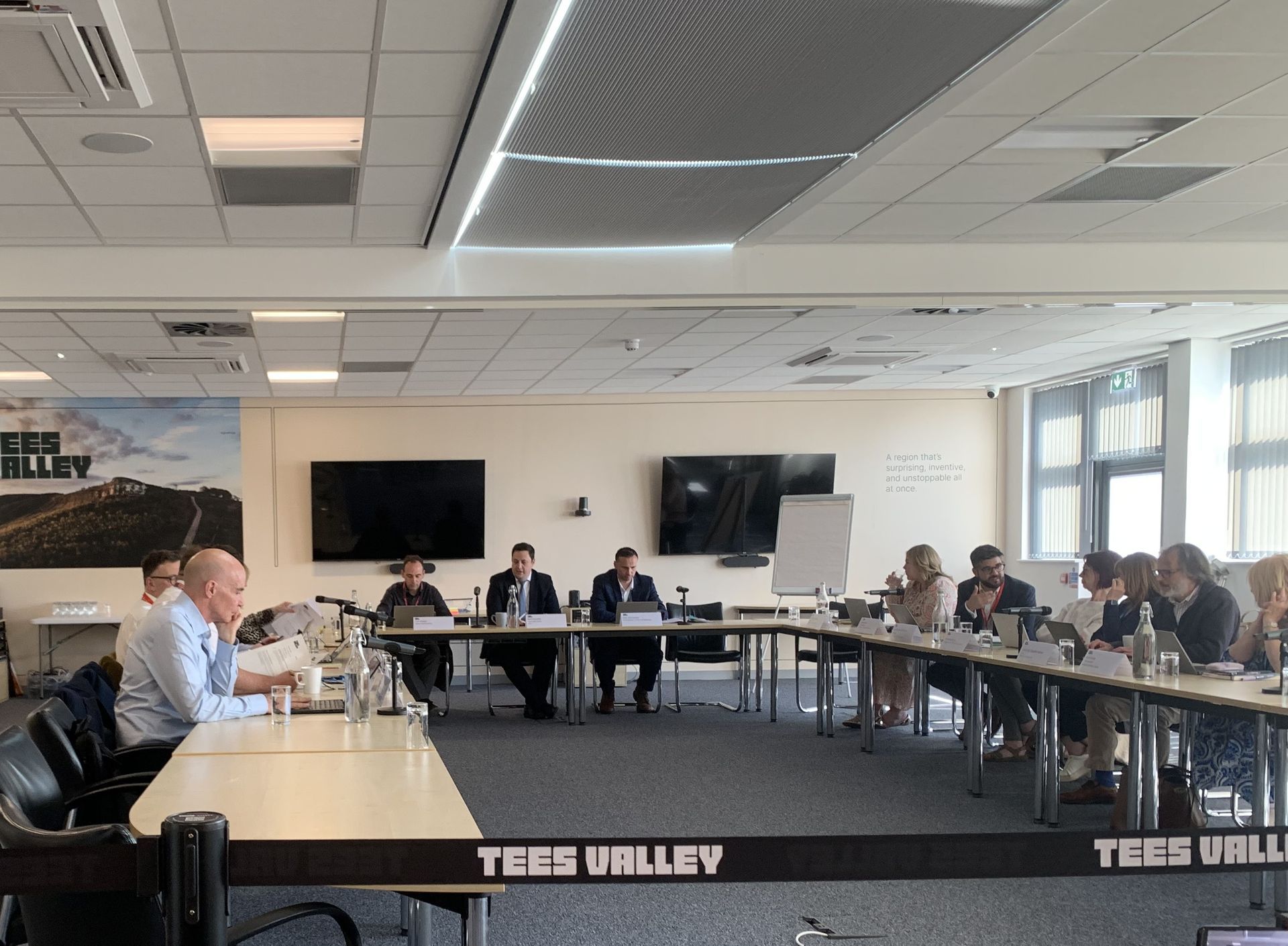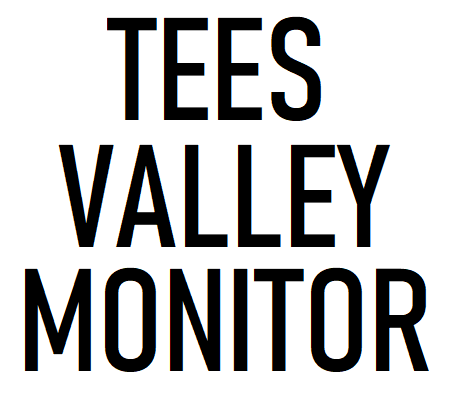TVCA in Crisis:
Cabinet Holds
Very Extraordinary
Meetings

TVCA Extraordinary Cabinet Meeting, 14 May
Scott Hunter
22 May 2025
Wednesday 14 May saw the extraordinary meeting of the Tees Valley Combined Authority Cabinet, convened to address the issues raised in a letter of complaint from their external auditor, Ernst & Young. This would have been worrying at the best of times but is compounded by the fact that Rayner’s department – the Ministry of Housing, Communities and Local Government (MHCLG) – has recently made the Authority subject to a Best Value Notice. The Panel that is being convened to undertake that process will rely heavily on the auditor’s report when evaluating the Authority’s performance. To make matters worse, E&Y copied their letter of complaint to Angela Rayner.
If the members of the cabinet were uneasy about the crisis at the Authority, they did their best not to show it in public. Interim TVCA CEO, Tom Bryant, began by saying that they took the complaint very seriously, but in the 40 minutes it took to complete the business of the day, some of those present did not participate at all. The finance director, Gary Macdonald, presented a proposal in response, and shortly everyone agreed it. They had little choice as the deadline for responding to Ernst & Young’s complaint was the same day.
Perhaps it was the short time span that concentrated the minds of the TVCA cabinet. Or perhaps the reason they were so subdued is that, as has been reported to us, they had already held a meeting in camera two days previously. Perhaps they spoke candidly on that day and saw no need to do it again at the public meeting that Ernst & Young had stipulated should take place. As a result, the meeting on 14 May was little more than performance art, and if any further demands had been placed on TVCA by cabinet members there was no sign of any at the meeting. Just a meek acceptance of the less than adequate measures proposed by the Finance Director, of which more later.
The members of the public who took the trouble to attend and thus legitimate the meeting had their time wasted. While Ernst & Young also stipulated that meetings of the boards of South Tees Development Corporation, Middlesbrough Development Corporation, and Hartlepool Development Corporation should also meet by 14 May, these have not taken place and no date has been arranged for them.
Background to the Complaint
On 15 April, Ernst & Young presented the TVCA Cabinet with a letter containing a list of complaints about unacceptable delays in submitting accounts for audit, late publication of key documents, viz. annual governance statements, and difficulty in obtaining both documents (most notably the general ledger, which provides a detailed account of income and expenditure) and answers to queries.
The task of external audit passed from Mazars to Ernst & Young in 2024. Mazars had experienced similar difficulty, and, as a result, disclaimed the accounts both for 2022 and 2023. External audit runs to a timetable set by the government. It an Authority submits its accounts late, that puts pressure on the auditor to check them in time before the due date. If they are unable to complete their work, the accounts are ‘disclaimed’.
Accounts for 2022 and 2023 were finally completed, Ernst & Young report in their letter, only in December 2024. Their letter raises concerns that the finance team at the Authority lacks sufficient capacity to fulfil its statutory duties. So, at the extraordinary meeting, the finance director was able to reassure the cabinet that additional staff were being recruited.
Everyone at the cabinet meeting seemed happy with that, which is presumably the reason none asked why, given that the inability to fulfil statutory duties is a problem of some long standing, sufficient numbers of qualified staff hadn’t been recruited years ago. Why, for example, were additional staff not recruited when the external auditor disclaimed the 2022 accounts?
But the discussion of recruitment prompted a clearly staged exchange between the mayor and the finance director in which Houchen inquired whether it had been possible to benchmark the staffing capacity of the finance team against those of other authorities, to which the answer was that it had not been possible as comparable authorities were all too newly created for such benchmarking to take place. Given that the two work together, had they been genuine, there was no need to have the apparently spontaneous discussion in front of the assembled cabinet.
An officer from Stockton Council who was accompanying Council Leader, Lisa Evans, then informed them that there was no shortage of parallel organizations that could have provided such a benchmark and listed a few. It prompted no reaction, not even from the leader of the council who was sitting beside him, as the officer had, of course, naively spoken out of turn. Presumably no one had told him that this meeting was for cosmetic purposes only.
Stockton Council leader, Lisa Evans, was not the only person who did not speak during the meeting. The leader of Darlington Council didn’t either. The other council leaders asked occasional polite questions, not including the obvious one that the proposal to recruit additional staff, which is the sole proposal on offer, does not address the issue in Ernst & Young’s letter that their requests for information often go unanswered and even unacknowledged, particularly when these come from more junior E&Y staffers.
The failure to respond to such requests is not simply a manpower issue. It is evidence of an attitude problem both in the finance team and elsewhere in the Authority. E&Y’s letter provides an example whereby their request to be sent the general ledger on 8 January was not received until the beginning of April. But that request was made, not of the finance team, but of the Chief Legal Officer. Had the 14 May meeting been genuine, at least one of the assembled cabinet might have been expected to challenge the mayor on the apparent resistance by TVCA officers to disclose information. But no one did.
The Apoplexy of Middlesbrough mayor, Chris Cooke
If the cabinet is being undermined by the Tees Valley and the Authority, then an appropriate action would be to deal with the issue collectively and preemptively. This they appear to be unwilling to do.
After the last cabinet meeting on 28 March, we reported (tees-valley-authority-to-be-issued-with-best-value-notice) that Middlesbrough mayor, Chris Cooke, had commented that it would have been preferable if the package of measures under discussion had been disaggregated, so that each could be evaluated separately. We observed at the time that this was a pointless comment, given that bundling items for approval together like this is a well-used tactic by Houchen. Cabinet members are well aware of this and have been forced to agree controversial proposals in the past that have been presented using this method. Yet they have done nothing that we are aware of to pre-empt the use of this tactic.
After that meeting, we submitted a FOI request to Chris Cooke’s office. We were trying to ascertain whether Cooke had met with other cabinet colleagues prior to the 28 March meeting, or had sought advice on the issue from elsewhere, specifically MHCLG and Middlesbrough MP, Andy McDonald, or approached TVCA officers prior to the meeting to redraft the document and disaggregate the proposals.
The response we got serves as a perfect illustration of how frustrating it can be to try to obtain information from public bodies. The first response from the Council’s Governance and Information manager was a blanket “Middlesbrough Council do hold the requested information.”
One of our questions asked for the date on which Mayor Cooke received the ‘Refresh’ document that was to be discussed at the 28 March meeting. Given that their response inferred that the Council does not know when it receives correspondence, which we thought unlikely, we lodged an appeal.
Our reason for asking when he received the document was that, in the past, cabinet members have been sent documents so late that they do not have time to appraise them in advance of meetings (this was one of the criticisms around governance made in the 2024 Tees Valley Review). On this occasion, however, the relevant document was sent out eight days in advance of the meeting. Time enough for corrective action to be taken, or at least initiated.
As best we can ascertain from the evasive responses to our appeal by Middlesbrough Council’s Governance and Information manager, mayor Cooke did not ask TVCA officers to redraft the ‘Refresh’ document; he did not consult with other cabinet members over the issue in advance of the 28 March meeting; and he did not consult with any external agencies.
To be fair, we recognize that responsibility for this situation does lie solely with mayor Cooke. That is shared by all of the council leaders who attend cabinet. It’s just that Cooke’s actions provide an illustration of how ineffectual cabinet members are at managing situations where Houchen is making fools of them.
Wall of Obstruction
The day after the extraordinary meeting on 14 May a second was convened and the councils leaders summoned at only a few hours’ notice to approve plans for further devolution of adult education. LDRS reporter, Daniel Hodgson, reports that Middlesbrough mayor, Chris Cooke, was ‘apoplectic’ at being summoned at such short notice.
Such outbursts of righteous indignation, however, are not a constructive response to this. The demand for actions to be taken and decisions to be made at very short notice is another well-used tactic by the TVCA mayor.
At the 28 March meeting, the cabinet was presented with a bid for funding for the airport. All local councils could have bid for this funding for their own projects, but only the airport and Redcar Council submitted one on time (Redcar’s was rejected). Some cabinet members questioned why the request for bids hadn’t been circulated earlier, to which Houchen declared that the funding bids for projects had, of necessity, been made at short notice, and only the airport had submitted an acceptable bid in time.
A few days later, a decision (the nature of which was not disclosed) had to be made at the South Tees Development Corporation using emergency powers, as it was needed at short notice while the previously convened meeting was inquorate. Then on 16 May cabinet members are summoned at extremely short notice to agree measures for adult education.
A further example whereby Houchen and TVCA officers maintain a stranglehold on information relates to committees and company boards on which local councillors serve. In these instances, it is standard practice for a substitute to be nominated to attend when the named councillor cannot attend. One such reported to us an occasion when he was asked to attend a board meeting as a substitute but was refused access to the documentation for the meeting by TVCA officers. The documents were finally handed over to him only at the very start of the meeting, rendering his attendance completely pointless.
So, the ‘short notice’ tactic, like the bundling of proposals and the refusal to provide information, succeeds over and again, while the cabinet fails to assert itself and demand adequate advance notice and proper presentation of agenda. As for hiring more staff in the finance team, it is pointless if they are then trained to apply TVCA obstruction techniques when dealing with outside agencies. Cabinet members have done nothing to prevent that from happening.
At the time of writing, we believe the LGA panel that will oversee the Best Value Notice pinned on the Authority is still being convened. It is therefore unclear at this point whether, in following the money, it will also pass judgement on tactics being used to prevent adequate oversight of the Authority’s actions. If it does, then the entire cabinet may find itself charged with complicity in the dysfunction.
